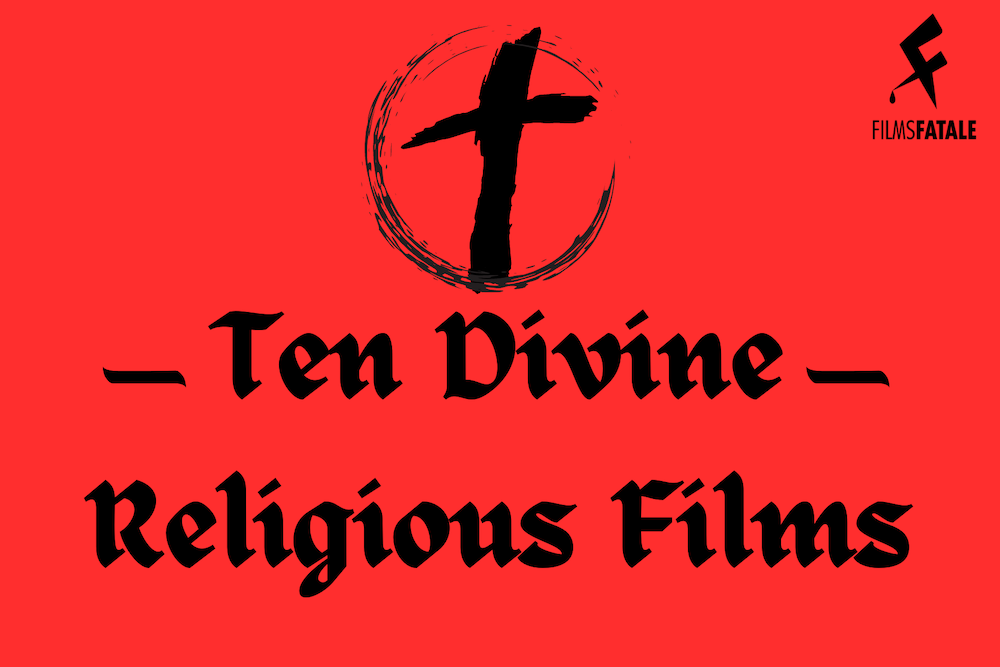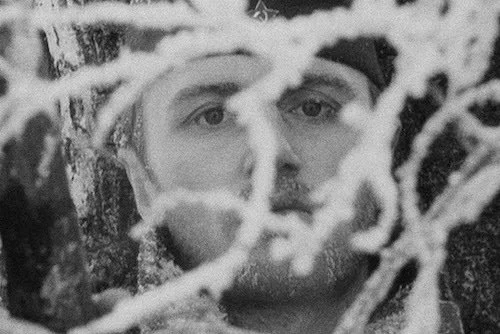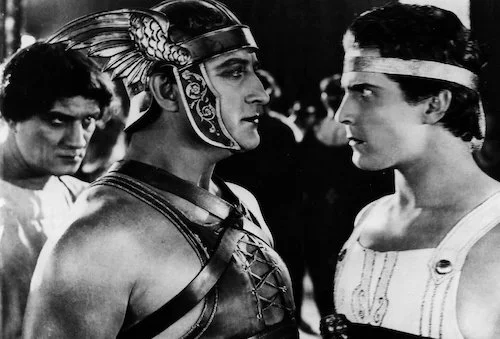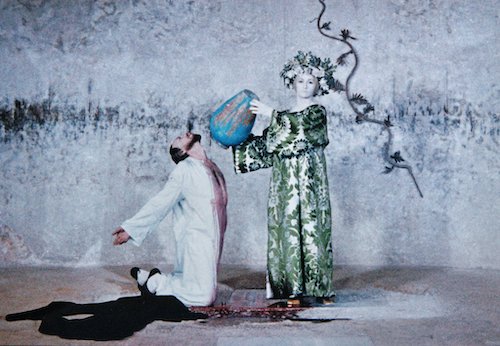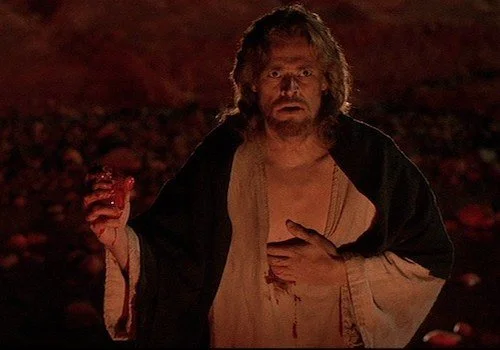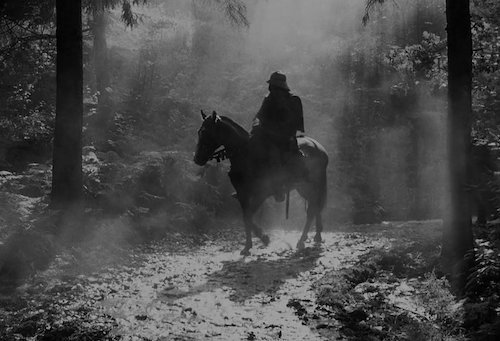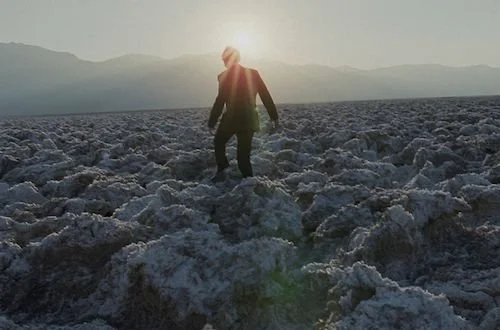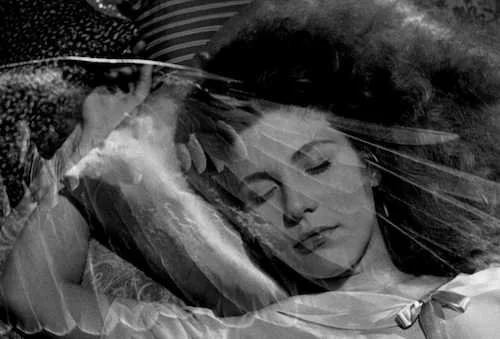Ten Divine Religious Films
Written by Andreas Babiolakis
The concept of what a religious film is is tricky when you think about it. Is a film religious because it simply features faith and devotion? If not, how much commitment does a film need in order to be considered religious? That’s one side of this equation: the other is what makes for a good Christian film, because, believe me, there are many that simply aren’t worthwhile. Having said that, the best religious films will make even the most stone-cold of atheists feel like their souls are being nourished or tested. There’s a major difference between religious films and faith-based works, and you can read more about that in my article on the subject here (I won’t be including any faith-based films here because I think we can work with far stronger releases). This Good Friday, I want to focus on ten of the strongest films to fully embrace Christianity or evoke its themes with its most faithful or challenged followers. As it would be too tricky to narrow down all religions into a list of ten films, I’m focusing just on all forms of Christianity today (and will likely be making lists for films pertaining to other religions in the future). Which ten films feel the most spiritual? Which works embody biblical texts and put these words into action? What films are the best artistic and narrative takes on the Christian faith? Here are ten of my picks below.
Note: I’ll be avoiding any Christmas/holiday films as they belong on their own list for obvious reasons. I’ll be limiting the entries to one film per director, otherwise we’d have a couple of auteurs dominating this list of ten. Finally, I’ll be focusing on the films that aren’t just about religion but feel like religious experiences themselves (so I won’t be including a film like Black Narcissus despite its setting, characters, and themes because it plays far more like a psychological melodrama than a religious motion picture).
Andrei Rublev (1966)
Andrei Tarkovsky is no stranger to releasing religious-based films (Mirror is my personal favourite film of his, but I felt like this film — which is also masterful — fit better on a list of this nature). His second feature film, Andrei Rublev, is a strong example of how one’s Christian faith can be showcased in a film. The titular icon painter has his life turned into a series of parables: the events that shaped who he is as a man and a follower of God. The epilogue contrasts the black-and-white vignettes that came before it with rich colour, documentary-like depictions of Rublev’s iconography, as if to conclude what all of these tests were for. You can see his passion and faith in his painting, and director Tarkovsky hoped to do the same via his film’s artistry (he more than succeeds).
The Ascent (1977)
Larisha Shepitko’s masterpiece, The Ascent, pits two Soviet partisans against World War II, the natural elements, and starvation. While not explicitly a film about religion, The Ascent has a pair of lost souls facing the odds and trying to either make it out of this predicament alive or face the pearly gates and end their suffering. There’s a reason why there are two protagonists: so Shepitko can best explore both options and what they would look like to those who are trying their best to face God’s tests in this parable-like story. The tone of The Ascent is similarly a dichotomous one: not only will you feel the weight of the world on your shoulders, you’ll also experience that titular euphoria when the release finally hits.
Ben-Hur: A Tale of the Christ (1925)
I don’t mean to be a contrarian, but I much prefer silent version of Ben-Hur: A Tale of the Christ to the Oscar-juggernaut, far-more popular and recognized film from the fifties. This Fred Niblo film (which technically isn’t even the first Ben-Hur, as there is a 1907 short adaptation of Lew Wallace’s novel) is far more direct with its storytelling overall, and its ties to the story of Jesus Christ feel far stronger (which also makes it, to me, feel more fitting for this list). If you aren’t apprehensive about the idea of watching a silent epic, then this take on the story of Judah Ben-Hur and his ties to Jesus is more than worthwhile (although the controversial animal cruelty in the film feels anything but Christ-like, just as a warning).
The Color of Pomegranates (1969)
While Sergei Parajanov’s magnum opus, The Color of Pomegranates, is more of a depiction of the life of ashik Sayat-Nova, the heavy inclusions of Armenian cultural elements and religious connotations make this avant-garde classic feel highly appropriate for this list. Every single shot looks like a moving icon, showcasing Parajanov’s deep understanding of how much context and purpose can be instilled into static images. It’s impossible to fully understand The Color of Pomegranates upon one’s first watch, but your quest to find meaning and history within the film feels like your own test that further connects your relationship with the film (and, perchance, creates a stronger bond between you and your faith in the process).
The Gospel According to St. Matthew (1964)
Of course, the late Pier Paolo Pasolini would become far more known for his taboo and shocking films, but it shouldn’t be forgotten that one of his strongest films is also a brilliant take on the biblical epic (many think this film is the definitive Jesus Christ film, and I can’t really fault them on that front). The Gospel According to St. Matthew is a deviation from typical depictions of the son of God via an Italian neorealist lens (as to liken Christ’s experience with those who pray to him for answers) while incorporating then-contemporary political and social viewpoints, making Jesus’ sacrifice a generational one. Pasolini’s films can take us to hell and back, but with The Gospel According to St. Matthew, you may never feel closer to Jesus Christ than this.
The Last Temptation of Christ (1988)
If Pasolini tried to make Jesus Christ feel comparable to those who depend on his guidance, then Martin Scorsese went the distance with how the son of God would be challenged as a flawed mortal in The Last Temptation of Christ. Deemed blasphemous upon its release, I think most viewers have actually taken time to understand what the film is depicting about the human side of God since. As Jesus Christ is placed in the ultimate dilemmatic situation with the state of humanity at risk, not many films allow us to understand the psychological and spiritual gravity of this predicament quite like this one. The Last Temptation of Christ vows to veer off the path of typical Jesus Christ films — even with the gamble of being seen as sacrilegious — to fully depict what this oft adapted tale would feel like if it happened to us.
The Passion of Joan of Arc (1928)
Carl Theodor Dreyer is another filmmaker who could have a few films pop up on a film of this nature (Ordet was a strong consideration, but I cannot deny the devotion of the film I wound up selecting). His silent-era masterwork, The Passion of Joan of Arc, likens the patron saint’s final hours to those of Jesus Christ. Featuring Renée Jeanne Falconetti’s untouchable performance (truly one of the greatest of all time) as Jeanne d’Arc, we watch a martyr face her imminent execution and attempt to speak to God in the interim. A harrowing film, The Passion of Joan of Arc is what complete divinity and sacrifice looks like in a religious context.
The Seventh Seal (1957)
Swedish auteur Ingmar Bergman often struggled with his faith; depending on the film, you’d either see him as a religious follower, a staunch atheist, or an agnostic who follows religious principles without practicing Christianity. His spiritual tug-of-war was apparent in quite a few films like Winter Light and Fanny and Alexander, but he places his soul search in the confinements of the Middle Ages with The Seventh Seal. As he seeks God in the darkest hour (narratively, we follow the spread of the Black Plague and its next victims via an allegorical game of chess with Death), we also spot those who are abandoned in society. Simultaneously, we find spiritual exaltation amidst the hardship, even if in a delirious way; perhaps this is when Bergman found his bond to his faith (at his most feverish and existential).
The Tree of Life (2011)
While Terrence Malick also has a few films that can be placed here, I think The Tree of Life is a straight-up given. No film has made Earth feel like God’s gift — or like heaven itself — quite like this one. With Emmanuel Lubezki’s gorgeous cinematography, we find it easy to cherish life. In that same breath, we grieve (as the majority of the film reminisces via hindsight), reflecting on the meandering roads of life, spirituality, dreams, and yearning. This may also be one of the only religious cinematic experiences you’ll have where dinosaurs are included as well (The Tree of Life clearly blends Malick’s fascinations with history and science with his Christianity); this contrasts heavily with the breathtaking epilogue where we are taken to the beyond to reunite with the souls we’ve lost along the way.
Wings of Desire (1987)
While the concept of guardian angels can feel kitschy, Wim Wenders handles the trope perfectly in Wings of Desire: the greatest film about these heavenly beings. We soar all over the world (almost literally so, with ghostly, moving camerawork) and view civilization as spirits, looking for those who are in search of help from higher beings. At the same time, we follow an angel who wants to give up his connection with eternity to become a mortal and experience life with a loved one, and it is this very moment where Wings of Desire permanently changes (I won’t dare spoil how), resulting in a moment that is so magical that you may feel the touch of God’s presence within it.
Andreas Babiolakis has a Masters degree in Film and Photography Preservation and Collections Management from Ryerson University, as well as a Bachelors degree in Cinema Studies from York University. His favourite times of year are the Criterion Collection flash sales and the annual Toronto International Film Festival.

